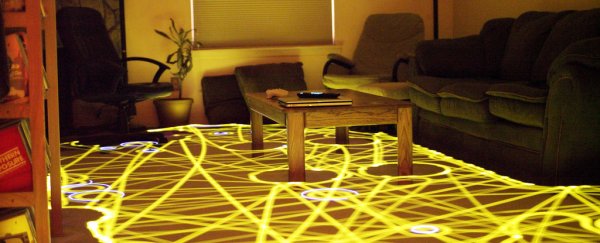Robovacs like the Roomba may be awesomely convenient helpers around the home, but buying a robot to clean up after you could come at a hidden cost.
Unguarded comments from the leader of iRobot – the maker of the Roomba – have lit a firestorm of controversy over this previously most uncontroversial of tech, after he appeared to say his company would soon be selling interior maps of people's homes to third parties.
"There's an entire ecosystem of things and services that the smart home can deliver once you have a rich map of the home that the user has allowed to be shared," CEO Colin Angle told Jan Wolfe at Reuters last week in an interview.
In the original article, Reuters reported that Angle planned for iRobot to enter the 'smart home' category, and could be reaching a deal to sell maps of people's home layouts to the 'Big Three' – Amazon, Apple, and Google – within the next couple of years.
Understandably, this didn't go down too well, with media reports slamming the company for its intention to sell "maps of your home to the highest bidder".
What makes this possible at all is technology inside newer, higher-end Roomba models, which incorporate cameras and other features to perform mapping of internal home layouts while they go about sucking up our dust, crumbs, and pet hair.
Of course, those upgraded specs were originally billed as being technology that would enable the devices to simply clean our houses better – but it now appears that an added side benefit is the machines' abilities to snoop on what our home looks like, and then supply that data to people who want to sell us stuff.
Despite the obvious privacy concerns, commentators said the move could be good for iRobot from a business perspective.
"I think they have a tremendous first-mover advantage," hedge fund manager Willem Mesdag told Reuters.
"The competition is focused on making cleaning products, not a mapping robot."
Unfortunately, that last bit there actually gets to the root of the problem here.
When ordinary people buy robovacs like Roombas, we tend to actually think we are getting a cleaning product, albeit a pretty fancy one. What we don't think we're buying – but, yep, are actually purchasing it seems and bringing right into our homes – is a mapping robot that reports to somebody else.
To hose down the controversy, iRobot has gone into damage control mode after the comments came to light – and Reuters has now amended its original report to indicate that rather than selling maps, the company will "share maps for free with customer consent".
So it seems Reuters might have misinterpreted Angle's comments when it came to the selling of the data – but the supply of the data to companies like Amazon, Apple, and Google isn't being contested.
That's still very much on the table, provided you give your consent (probably in one of those multi-page EULAs nobody ever actually reads).
To clarify the situation, the company has now issued a statement to ZDNet.
"First things first, iRobot will never sell your data," Angle explains.
"Information that is shared needs to be controlled by the customer and not as a data asset of a corporation to exploit. That is how data is handled by iRobot today. Customers have control over sharing it. I want to make very clear that this is how data will be handled in the future."
That's a valuable clarification, and it makes clear that the company won't be selling every nook and cranny of your home's floor layout any time soon – and won't be sharing anything without your consent. That's good.
But the way this thing blew up on iRobot is a timely reminder to us all, and not just to read the fine print.
As technology gets ever more sophisticated and internet-connected, the days of buying mere cleaning products are drawing to an end – and the dawn of the mapping robots is now at hand.
